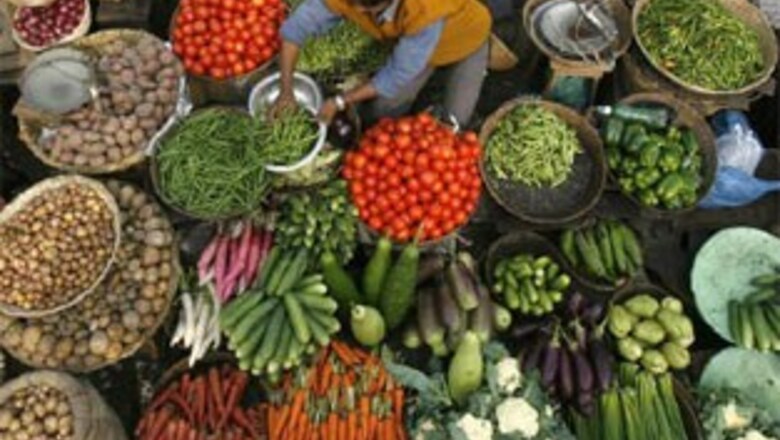
views
New Delhi: Food inflation galloped to a more than 10-year high of 19.95 per cent as of December 5, prompting an increasingly concerned government to think of stepping up imports to ease prices.
Prices of potato, other vegetables and pulses had driven inflation higher from the previous week's 19.05 per cent.
"Food prices are going up and this is an area of concern... we have to take appropriate measures to see what best could be done by augmenting the supply through imports," Finance Minister Pranab Mukherjee told reporters even as a Parliamentary committee pulled up his Ministry for not taking timely action to check price rise.
Rising inflation may force the Reserve Bank of India to withdraw easy money policy in January review of the monetary policy and jack up policy rates and ratios to withdraw liquidity from the system.
Despite easing of import restrictions by the government to augment supplies, food inflation soared to close to 20 per cent, driven by pulses, milk, wheat and rice, besides costlier vegetables including potatoes.
On an annual basis, potato prices zoomed 136 per cent and pulses became costlier by over 40 per cent. Onion prices rose 15.4 per cent. Other food items that became dearer include wheat 14 per cent, milk 13.6 per cent, rice 12.7 per cent and fruits 11 per cent.
Food price inflation was triggered by a short supply of essentials owing to lower farm output following drought and floods in many parts of the country in the year.
While pulling up the finance ministry on rising prices, the Standing Committee on Finance in its report called upon the government to take immediate steps to provide relief to the common man.
Besides other things, it asked the government to amend the Essential Commodities Act to check hoarding and speculation.
"The Ministry of Finance... has obviously failed to ntervene timely and squarely address this burning issue (price rise) with due seriousness," it said.
The comprehensive wholesale price inflation, which includes manufactured products in addition to food and fuel items, rose to 4.78 per cent in November from 1.34 per cent in October.
"By the end of March 2010, it (inflation) could be close to seven per cent," Prime Minister's Economic Advisory Council Chairman C Rangarajan had said earlier this week.
"We need to watch for behaviour of prices in December... possibly some action will be taken (by the RBI), which can have a moderating effect (on inflation)," said Rangarajan, a former Reserve Bank governor.
The RBI, which keeps a close watch on inflation and growth, is slated to come out with third quarterly review of monetary policy on January 29, 2010.
The central bank had already raised the fiscal-end inflation forecast to 6.5 per cent from 5 per cent earlier.
















Comments
0 comment